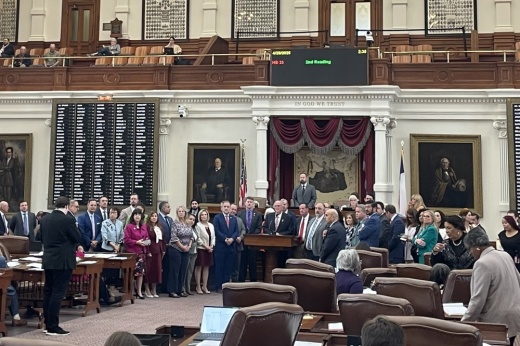At a glance
House Bill 33, by former Uvalde mayor and freshman state Rep. Don McLaughlin, would direct school districts and law enforcement to meet annually to plan their response to active shooter situations and other emergencies.
Nineteen children and two teachers were killed during the May 24, 2022, shooting at Robb Elementary School in Uvalde. It was the second-deadliest school shooting in the United States, according to the K-12 School Shooting Database, a website maintained by researcher David Riedman.
Information from the Texas Department of Public Safety and a House investigative committee showed that hundreds of law enforcement officers waited over an hour before neutralizing the gunman.
“HB 33 holds our agencies to a standard and ensures they answer the call without delay, confusion or excuses,” McLaughlin, R-Uvalde, said on the House floor April 28. “We owe it to the 19 students and two teachers from Robb Elementary and to every community across Texas to make sure this never happens again.”
House members passed HB 33 with a 148-0 vote on April 29.
In an April 3 interview with Community Impact, House Speaker Dustin Burrows, R-Lubbock, emphasized the importance of “good coordination and ... planning” by law enforcement agencies. Burrows led the House investigation of the shooting response and authored a 2023 law that requires armed officers on all public school campuses.
“We are in a situation in Texas where you have every different local jurisdiction, whether it's a hospital district or independent school district, creating their own police force,” Burrows told Community Impact. “I don't think that's a good situation. I think, in fact, it's a dangerous situation. [Under HB 33], if you're going to have your own agency, you have to have some minimal standards.”
More details
HB 33 would also require law enforcement agencies to convene annually for active shooter training exercises. McLaughlin said this would ensure various agencies know how to work together and have “clear chains of command.”
“As the mayor of Uvalde, I was one of the first on the scene that day. ... There was chaos everywhere,” McLaughlin said on the House floor. “Leadership was nowhere to be found. [HB 33] creates a clear, unified statewide response protocol, so the next time a crisis unfolds, law enforcement won't have confusion or uncertainty to hide behind.”
During a March 19 hearing on the bill, Chambers County Sheriff Brian Hawthorne said law enforcement agencies are still working to comply with school safety laws passed in 2023. Hawthorne said smaller sheriff’s offices do not have the resources to send officers to annual active shooter trainings or hold multiagency meetings.
“I still have murders and rapes and child abuse and all these other cases that I’ve got to keep working on,” Hawthorne said March 19. “We don't have that ability to drop what we do to spend weeks preparing for this. We have to figure out how to prepare for this catastrophic event in small increments of training, and [existing state law] allows us to do that.”
On the House floor April 28, McLaughlin said he worked with law enforcement agencies to address their concerns with HB 33.
“We brought law enforcement to the table and worked through the friction, found common ground and delivered a bill that demands coordination, clarity and courage to act,” McLaughlin told House members.
Rep. Joe Moody, D-El Paso, who served on the House committee that investigated the shooting, thanked McLaughlin for carrying the bill.
“There's nothing that anybody on this floor could say that would undo the tragedy of what happened in your community, but I think it's important that your first bill on this floor is a direct response to the failures that took place that day,” Moody said April 28.
One more thing
Texas lawmakers also passed legislation in April that would increase the annual school safety funding districts receive from the state. Senate Bill 260 proposes giving schools $14 per student and $37,000 per campus, up from the current allotments of $10 per student and $15,000 per campus.
The bipartisan bill was amended by the House. If the changes are approved by state senators, it will head to the governor’s desk.





